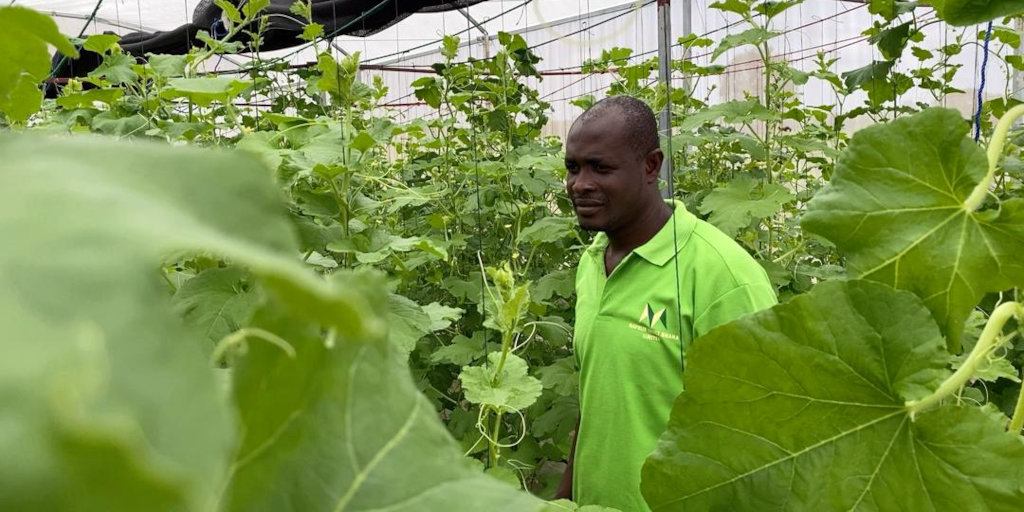Dora Torwiseh, CEO of Nuts for Growth
Three Ghanaian entrepreneurs are taking advantage of the country’s agricultural potential by exporting commodities, such as shea butter and palm oil, to international markets.
1. There’s global demand for Ghana’s shea nuts: This CEO saw an opportunity
Dora Torwiseh, a Ghanaian entrepreneur and CEO of the oilseed processing company Nuts for Growth, has tapped into the growing demand for shea nuts. The global market for shea butter, extracted from these nuts, is expected to surpass $3.5 billion by 2028, driven by its popularity in personal care products like lotions and moisturisers, as well as in food items such as chocolates and ice cream. Torwiseh left her corporate career to boost the shea nut industry in northern Ghana.
In this region, shea trees grow mostly in the wild, and the nuts are harvested by women who gather them from the ground. The local shea nut sector faced challenges, particularly the absence of large-scale aggregation among nut collectors, which discouraged international buyers looking for bulk purchases. To tackle this issue, Torwiseh began organising local shea nut pickers into a cohesive network.
Having structured this network, Torwiseh then turned her attention to securing markets for the shea nuts. Her persistence paid off when she attracted a Dutch buyer, now part of the US-based agribusiness giant Bunge, which remains a key client of Nuts for Growth. Today, Nuts for Growth links over 80,000 women with global buyers, including other major clients such as the American commodities giant Cargill. Read the full interview
2. Growing from a small palm oil exporter into a sizeable food business
Felicia Twumasi founded Homefoods in 1995 with a focus on exporting red palm oil. The company quickly gained significant market share through a UK partner and has since expanded its offerings to include a variety of spices, seasonings, sauces, and local Ghanaian favourites like gari.
“I decided to start with something people use every day but that had a longer shelf life,” she says. “In this part of the world, we use red palm oil to cook everything; 20 years ago you would struggle to even find vegetable oil.”
The first step was to visit the Kaneshie market in Accra and sample the product from a variety of merchants. “I bought oil from different women and used it for cooking. Finally, I found one supplier whose oil was great. I explained what I was planning to do and she laughed at me. But I bought a 200-litre drum of palm oil from her and, with difficulty, rolled it to my apartment where I was living with my daughter,” she remembers.
The next challenge was finding a buyer for the oil. In the pre-internet era, Felicia spent countless hours in the library researching palm oil and refining her business plan. She reached out to trade attachés at the American and British embassies, seeking potential buyers. “The British attaché provided some leads. I wrote a lot of letters and sent faxes. Fortunately, one company replied,” she says. “We communicated by phone and fax, and he ordered 100 cartons.”
And just like that, Homefoods was in business. Felicia bought the bottles she needed and printed labels. She did not have a car, so she hitched a ride to the port with her cartons, believing she could simply book it on a ship and be done with it. “I did not know you had to fill an entire container, or join the wait with smaller suppliers until one container was filled,” she admits.
“It took a bit longer to get to the UK than I anticipated but within a week of arriving, it sold out and the buyer ordered another 300 cartons.” His third order, two months later, was for a full container. Read the full interview
3. From side venture to export success
Ghana-based agribusiness company Maphlix Trust exports vegetables to international markets like the UK and Dubai and supplies local companies, including KFC and Shoprite.
In 2012, Felix Kamassah was an economist working in Ghana’s banking sector while dabbling in farming as a side venture. Raised by his aunt, who balanced her nursing career with growing her own vegetables, Kamassah learned that cultivating food can always be a part of one’s life, no matter your day job. “Fresh produce is something I love, and I enjoy being able to grow it myself,” he says.
Together with his wife, Kamassah began by planting cassava and maize on a piece of land in the Volta region, near the southeastern border with Togo. Local demand soon spurred the expansion of their business into various other crops, and in 2013, Kamassah resigned from his job to establish Maphlix Trust.
In its second year of operations, with assistance from the Ghana Export Promotion Authority, Maphlix participated in a trade fair in Germany. While there, Kamassah and his wife did market research to better understand European consumers and what they were interested in. Back in Ghana, they spent a year setting up the production of specific crops for which they identified demand in Germany.
“We again exhibited our product at the fair in 2015 and that’s when we started getting orders. Because we were already set up back home, we could supply quickly,” Kamassah explains. “A lot of those original clients are still with us today.” Read the full interview

